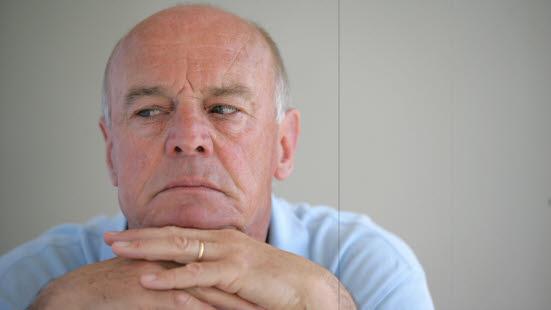Tvangslidelse, ulike symptomer
Tvangstanker og tvangshandlinger kan arte seg på mange ulike måter. I denne artikkelen kan du lese om noen typiske eksempler på tvangstanker og tvangshandlinger.

Sist oppdatert:
10. des. 2019
En tvangslidelse er karakterisert ved tvangstanker og tvangshandlinger. Tvangstankene er tilbakevendende tanker og mentale bilder som forårsaker markant ubehag. Tankene er uønskede og ikke forenlige med personens oppevelse av seg selv, og vedkommende bruker masse energi på å motstå og undertrykke dem. Det kan være tanker om smitte; tabu tanker av seksuell, religiøs eller aggressiv natur.
Tvangshandlinger er gjentatte handlinger eller mentale ritualer som utføres for å motvirke angsten som følger med. Personen føler seg tvunget til å utføre disse handlingene, og atferden blir automatisert etter hvert. Det kan være håndvask, sjekking og kontrollering, overdreven orden/ bønner/ telling/ forsikring om at alt er gjort rett.
Dette dokumentet er basert på det profesjonelle dokumentet Tvangslidelse . Referanselisten for dette dokumentet vises nedenfor
- Jenike MA. Obsessive-compulsive disorder. N Engl J Med 2004; 350: 259-65. PubMed
- Heymann I, Mataix-Cols D, Fineberg NA. Obsessive-compulsive disorder. BMJ 2006; 333: 424-9. PubMed
- Fenske JN, Petersen K. Obsessive-compulsive disorder: diagnosis and management. Am Fam Physician. 2015 Nov 15;92(10):896-903. pmid: 26554283 PubMed
- Ruscio AM, Stein DJ, Chiu WT, Kessler RC. The epidemiology of obsessive-compulsive disorder in the National Comorbidity Survey Replication. Mol Psychiatry. 2010;15(1):53–63. pmid: 18725912 PubMed
- Wittchen HU, Jacobi F. Size and burden of mental disorder in Europe: a critical review and appraisal of 27 studies. Eur Neuropsychopharmacol 2005; 15: 357-76. PubMed
- Heyman I, Fombonne E, Simmons H, Ford T, Meltzer H, Goodman R. Prevalence of obsessive-compulsive disorder in the British nationwide survey of child mental health. Br J Psychiatry 2001; 179: 324-9. pmid: 12745330 PubMed
- Pauls DL, Abramovitch A, Rauch SL, Geller DA. Obsessive-compulsive disorder. Nat Rev Neurosci. 2014;15(6):410–424. pmid: 24840803 PubMed
- Becker Nissen JB, Mikkelsen HU, Thomsen PH. Den neurobiologiske baggrund for obsessiv kompulsiv forstyrrelse. Ugeskr Læger 2005; 167: 34-7. PubMed
- Pallanti S, Quercioli L. Treatment-refractory obsessive-compulsive disorder: methodological issues, operational definitions and therapeutic lines. Prog Neuropsychopharmacol Biol Psychiatry. 2006;30:400-412. PubMed
- Pinto A, Mancebo MC, Eisen JL, et al. The Brown Longitudinal Obsessive Compulsive Study. J Clin Psychiatry. 2006;67(5):703–711. pmid: 16841619 PubMed
- Torres AR, Ramos-Cerqueira AT, Ferrão YA, et al. Suicidality in obsessive-compulsive disorder. J Clin Psychiatry. 2011;72(1):17–26. pmid: 21272513 PubMed
- Fineberg NA, et al. Clinical screening for obsessive-compulsive and related disorders. Isr J Psychiatry Relat Sci. 2008;45(3):151–163. pmid: 19398819 PubMed
- Öst LG, Havnen A, Hansen B, Kvale G. Cognitive behavioral treatments of obsessive-compulsive disorder. A systematic review and meta-analysis of studies published 1993-2014. Clinical Psychology Review, 2015; 40: 156–169. doi:10.1016/j.cpr.2015.06.003 DOI
- Diedrich A, Voderholzer U. Obsessive-compulsive personality disorder: a current review. Curr Psychiatry Rep. 2015 Feb;17(2):2. pmid: 25617042 PubMed
- Olatunji BO, Davis ML, Powers MB, et al. Cognitive-behavioral therapy for obsessive-compulsive disorder: a meta-analysis of treatment outcome and moderators. J Psychiatr Res. 2013 Jan;47(1):33-41. DOI: 10.1016/j.jpsychires.2012.08.020. DOI
- Pediatric OCD Treatment Study (POTS) Team. Cognitive-behavior therapy, sertraline, and their combination for children and adolescents with obsessive-compulsive disorder: the pediatric OCD treatment study (POTS) randomized controlled trial. JAMA 2004; 292: 1969-76. pmid: 15507582 PubMed
- Foa EB, Franklin ME, Moser J. Context in the clinic: how well do cognitive-behavioral therapies and medications work in combination? Biol Psychiatry 2002;52:987-997. PubMed
- Rosa-Alcázar AI, et al. Psychological treatment of obsessive-compulsive disorder. Clin Psychol Rev. 2008;28(8):1310–1325. pmid: 18701199 PubMed
- Gava I, Barbui C, Aguglia E, et al. Psychological treatment versus treatment as usual for obsessive compulsive disorder (OCD). Cochrane Database of Systematic Reviews, issue 2, 2007. CD005333.pub2 Cochrane (DOI)
- Hansen B, Kvale G, Hagen K, Havnen A, Öst LG. The Bergen 4-day treatment for OCD: four years follow-up of concentrated ERP in a clinical mental health setting. Cogn Behav Ther 2018. www.tandfonline.com
- Barrett P, Healy-Farrell L, March JS. Cognitive-behavioral family treatment of childhood obsessive-compulsive disorder: a controlled trial. J Am Acad Child Adolesc Psychiatry 2004; 43: 46-62. PubMed
- Simpson HB. Pharmacotherapy for obsessive-compulsive disorder in adults. UpToDate, last updated Jun 22, 2017. www.uptodate.com
- Andersson E, Enander J, Andrén P, et al. Internet-based cognitive behaviour therapy for obsessive-compulsive disorders: a randomized controlled trial. Psychological Medicine 2012; pmid: 22348650 PubMed
- Hirschtritt ME, Bloch MH, Mathews CA. Obsessive-Compulsive Disorder Advances in Diagnosis and Treatment. JAMA 2017; 317(13): 1358-67. doi:10.1001/jama.2017.2200 DOI
- Soomro GM, Altman D, Rajagopal S, Oakley-Browne M. Selective serotonin re-uptake inhibitors (SSRIs) versus placebo for obsessive compulsive disorder (OCD). Cochrane Database Syst Rev. 2008;(1):CD001765. Cochrane (DOI)
- Koran LM, Hackett E, Rubin A, Wolkow R, Robinson D. Efficacy of sertraline in the long term treatment of obsessive-compulsive disorder. Am J Psychiatry 2002; 159: 89-95. pmid: 11772695 PubMed
- Koran LM, et al. Practice guideline for the treatment of patients with obsessive-compulsive disorder. Am J Psychiatry. 2007;164(7 suppl):5–53. pmid: 17849776 PubMed
- Fineberg NA, et al. Evidence-based pharmacotherapy of obsessive-compulsive disorder. Int J Neuropsychopharmacol. 2012;15(8):1173–1191. pmid: 22226028 PubMed
- Berlim MT, Neufeld NH, Van den Eynde F. Repetitive transcranial magnetic stimulation (rTMS) for obsessive-compulsive disorder (OCD): an exploratory meta-analysis of randomized and sham-controlled trials. J Psychiatr Res. 2013 Aug;47(8):999-1006. PubMed
- Ravizza L, Maina G, Bogetto F. Episodic and chronic obsessive-compulsive disorder. Depress Anxiety 1997; 6: 154-8. PubMed
- Baldwin DS, Anderson IM, Nutt DJ, et al. Evidence-based pharmacological treatment of anxiety disorders, post-traumatic stress disorder and obsessive-compulsive disorder: a revision of the 2005 guidelines from the British Association for Psychopharmacology. J Psychopharmacol. 2014 May;28(5):403-39. PubMed